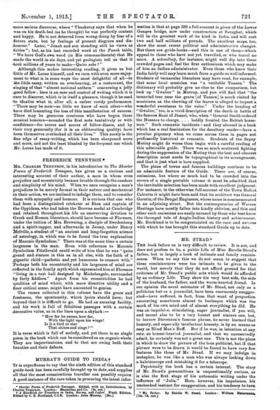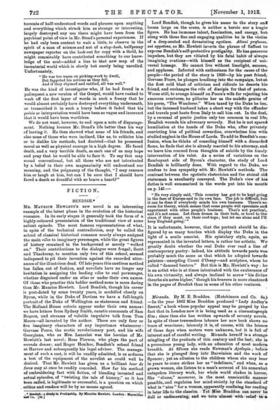MR. STEAD.*
THE book before us is very difficult to review. It is not, and does not profess to be, a public Life of Miss Estelle Stead's father, but is largely a book of intimate and family reminis- cence. When we say this we do not mean to suggest that these reminiscences were too intimate to be given to the world, but merely that they do not afford ground for that criticism of Mr. Stead's public acts which would be afforded by an ordinary Life. They show his very best side, the side of the husband, the father, and the warm-hearted friend. In our opinion the usual estimates of Mr. Stead, not only as a politician but as a journalist, have been enormously exagger- ated—have suffered, in fact, from that want of proportion amounting sometimes almost to burlesque which was the mark of his own mind and of almost everything he did. He was an impulsh e, stimulating, eager journalist, if you will, and meant also to be a very honest and sincere one, but, to borrow Stevenson's famous phrase, he never learned that honesty, and especially intellectual honesty, is by no means as easy as Blind Man's Buff. But if he was, in intention at any rate, an honest-hearted journalist, and that we unreservedly admit, he certainly was not a great one. This is not the place in which to draw the picture of the true publicist, but if that picture were to be drawn it would be found to have very few features like those of Mr. Stead. If we may indulge in metaphor, he was like a man who was always looking down a kaleidoscope and mistaking it for a telescope.
Psychically the book has a certain interest. The story of Mr. Stead's premonitions is unquestionably curious, as is also the first stage of his automatic writing under the influence of "Julia." Here, however, his impatience, his unchecked instinct for exaggeration, and his tendency to turn • My Father, By Estelle W. Stead. London : Williaan Heinemann, [toe. Ed. net.]
torrents of half-understood words and phrases upon anything and everything which struck him as strange or interesting, largely destroyed any use there might have been from the psychical point of view in Mr. Stead's personal experiences. If he had only been content to wait a little, to observe in the spirit of a man of science and not of a slap-dash, halfpenny newspaper reporter on the look-out for copy with a thrill, he might conceivably have contributed something to our know- ledge of the soul—added a line to that new map of the immaterial world which is slowly but surely being unrolled. Unfortunately,
"He was too warm on picking-work to dwell,
But faggoted his notions as they fell,
And if they rhymed and rattled, all was well."
He was the kind of investigator who, if he had found in a palimpsest a new version of the Gospel, would have rushed to wash off the first layer of words in such a frenzy that he would almost certainly have destroyed everything underneath, or transcribed it in such a hurry before it faded that hia precis or interpretation would have been so vague and incorrect that it would have been worthless.
We do not want, however, to end upon a note of disparage- ment. Nothing became Mr. Stead's life better than his way of leaving it. He then showed what none of his friends, and also none of those who were inclined, like us, to criticize him or to dislike his methods, had doubted—that he possessed moral as well as physical courage in a high degree. He faced death, and a very terrible death, as each one of us may hope and pray that he would be able to face it. To say this may sound conventional, but all those who are not intoxicated by a belief in their own magnanimity will understand our meaning, and the poignancy of the thought, "I may censure him or laugh at him, but can I be sure that I should have faced a death so dreadful with so brave a heart?"































































 Previous page
Previous page